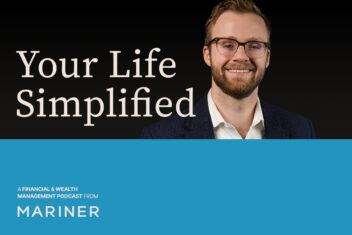Do You Have a Plan for Leaving Wealth to Beneficiaries?

Given the potential tax changes on the horizon and the current low interest rate environment, it’s a good time for baby boomers to think about how they will use wealth during retirement and how they want to eventually transfer wealth to heirs. It’s also a good time to educate their children on how to manage the wealth they will receive (See our recent Q&A on this topic.).
Baby Boomers Represent 70% of Affluent Household Wealth
We are experiencing the greatest wealth transfer in U.S. history. While estimates vary widely, it’s expected that baby boomers will transfer around $30 trillion to as much as $70 trillion in wealth to younger generations in the coming years.
It’s also estimated that by 2030, all baby boomers will be at age 65 years old and older. This age group accounts for 70% of current affluent household wealth.
Educate Millennials on Managing New Wealth
The “great wealth transfer,” including assets like real estate, will go to heirs, charities, estate taxes and estate closing costs. Millennials are expected to inherit a greater portion of wealth yet to be transferred; however, Generation X has begun inheriting wealth from the “silent” generation (those born before baby boomers) and from their older baby boomer parents.
This great wealth transfer may be accelerated rather than a gradual transfer over decades with many seniors having died earlier than expected due to the pandemic. The result is that family members may experience an unexpected inheritance years ahead of schedule and will likely need guidance in how to manage their newfound wealth.
Concerns that some wealth would be lost due to the COVID-related market swings didn’t materialize with the market rebounding more quickly than expected after the peak of the pandemic.
Update Your Estate Planning Documents
As part of a wealth transfer plan, baby boomers should have key estate planning documents in place, including a will, and update their estate plan every three to five years to help ensure assets are properly titled, wishes for who receives the wealth are defined and beneficiaries are current. Effective estate planning can reduce the tax burden for heirs.
Plan for the Unexpected
While we all hope to retire on our own terms, it’s a good idea to plan for the unexpected. It’s not unusual for people to retire earlier than planned either because they feel like they can afford to or because of a health problem or disability. According to the Employee Benefits Research Institute’s 2021 retirement study, the median age people retire is 62 although the age they expect to retire is 65.3 How early or late you retire may affect how much money you need to live on versus how much you can transfer to heirs.
Check in With Your Advisor
In the meantime, if it’s been awhile since you’ve reviewed your estate plan or since you and loved ones have met with a wealth advisor to discuss your wealth transfer plan, consider reaching out to Mariner. Your wealth team can help you navigate these sensitive conversations between you and family members and create a wealth transfer plan designed to minimize taxes you and your heirs may owe.
Do you need help with taxes, insurance, investments and retirement?
Discover the benefits of a wealth advisor who offers all of these services under one roof.
Sources:
1 “The Greatest Wealth Transfer: What boomers and Their Families Need to Know”
2 “Transitioning Baby Boomer Wealth to the Next Generation”
3 2021 Retirement Confidence Survey
This article is limited to the dissemination of general information pertaining to Mariner Wealth Advisors’ investment advisory services and general economic market conditions. The views expressed are for commentary purposes only and do not take into account any individual personal, financial, or tax considerations. As such, the information contained herein is not intended to be personal legal, investment or tax advice or a solicitation to buy or sell any security or engage in a particular investment strategy. Nothing herein should be relied upon as such, and there is no guarantee that any claims made will come to pass. Any opinions and forecasts contained herein are based on information and sources of information deemed to be reliable, but Mariner Wealth Advisors does not warrant the accuracy of the information that this opinion and forecast is based upon. You should note that the materials are provided “as is” without any express or implied warranties. Opinions expressed are subject to change without notice and are not intended as investment advice or to predict future performance. Past performance does not guarantee future results. Consult your financial professional before making any investment decision.
Mariner Wealth Advisors (“MWA”), is an SEC registered investment adviser with its principal place of business in the State of Kansas. Registration of an investment adviser does not imply a certain level of skill or training. MWA is in compliance with the current notice filing requirements imposed upon registered investment advisers by those states in which MWA maintains clients. MWA may only transact business in those states in which it is notice filed or qualifies for an exemption or exclusion from notice filing requirements. Any subsequent, direct communication by MWA with a prospective client shall be conducted by a representative that is either registered or qualifies for an exemption or exclusion from registration in the state where the prospective client resides. For additional information about MWA, including fees and services, please contact MWA or refer to the Investment Adviser Public Disclosure website (www.adviserinfo.sec.gov). Please read the disclosure statement carefully before you invest or send money.

